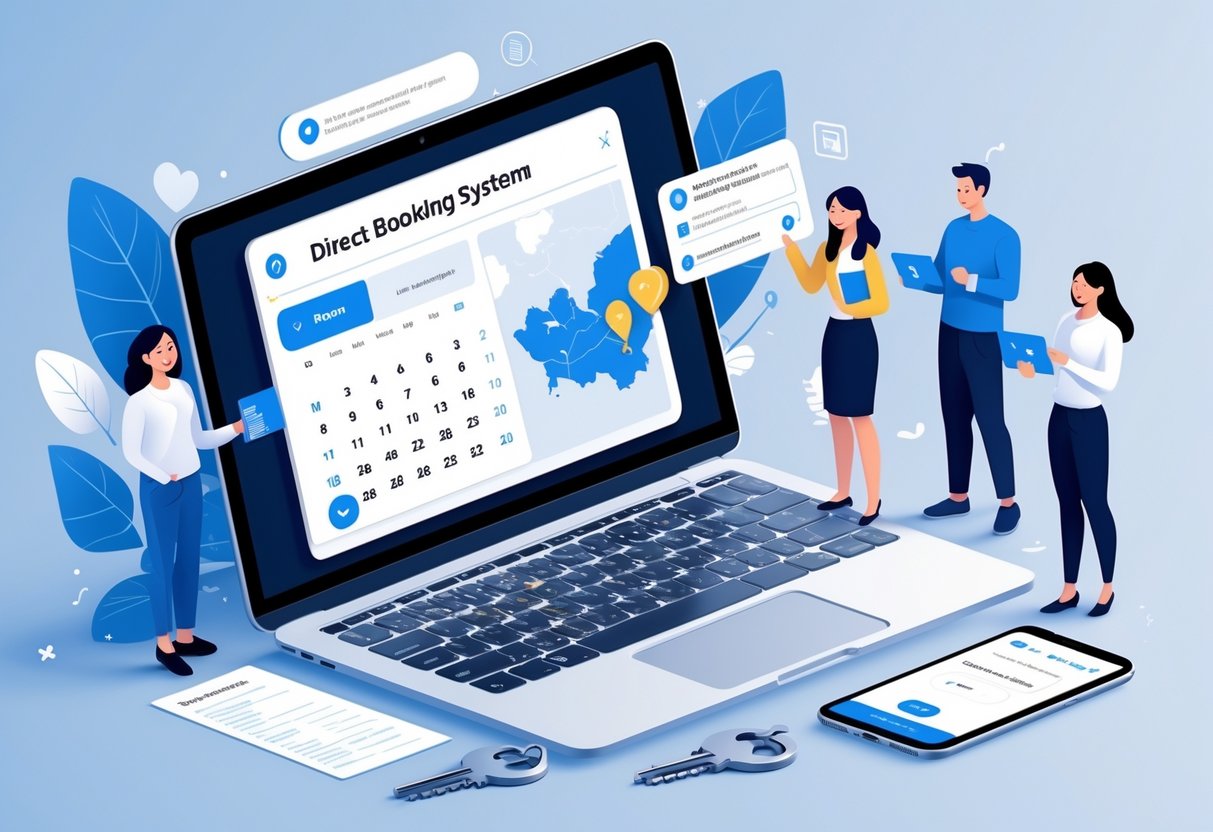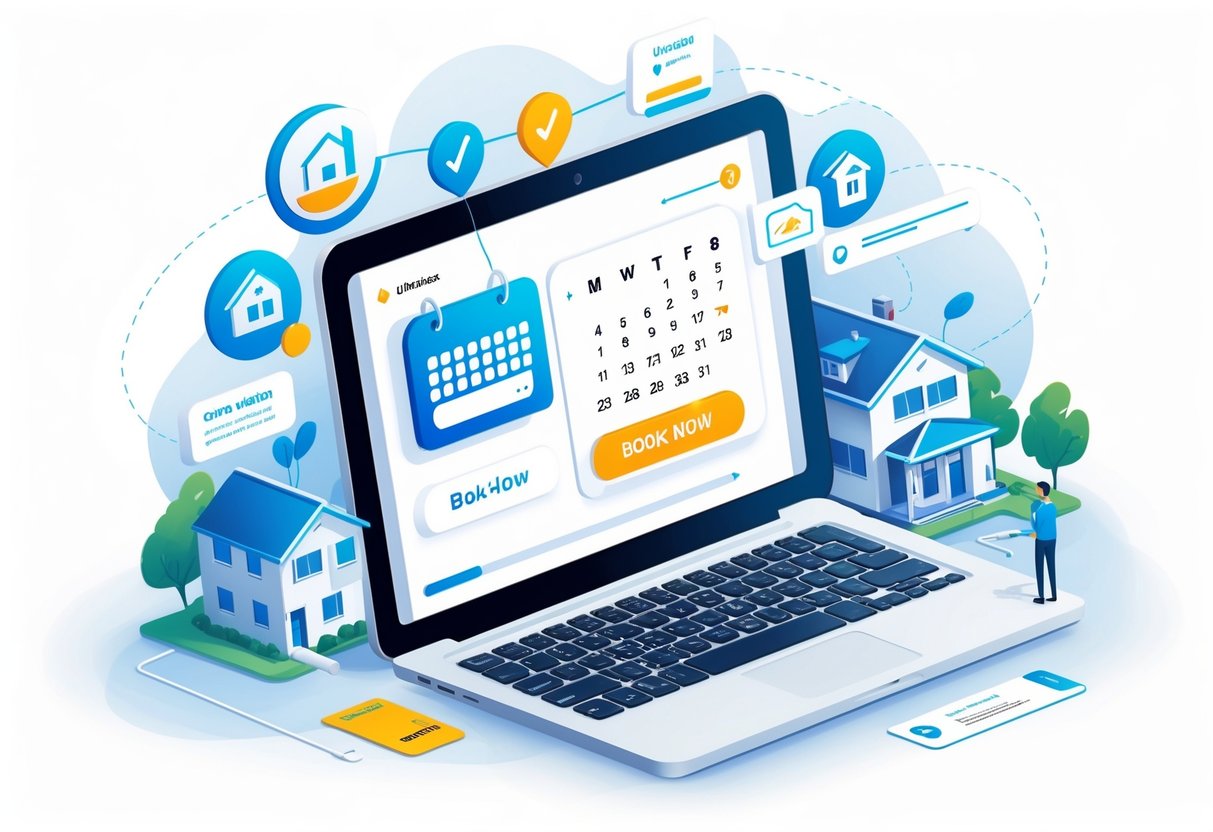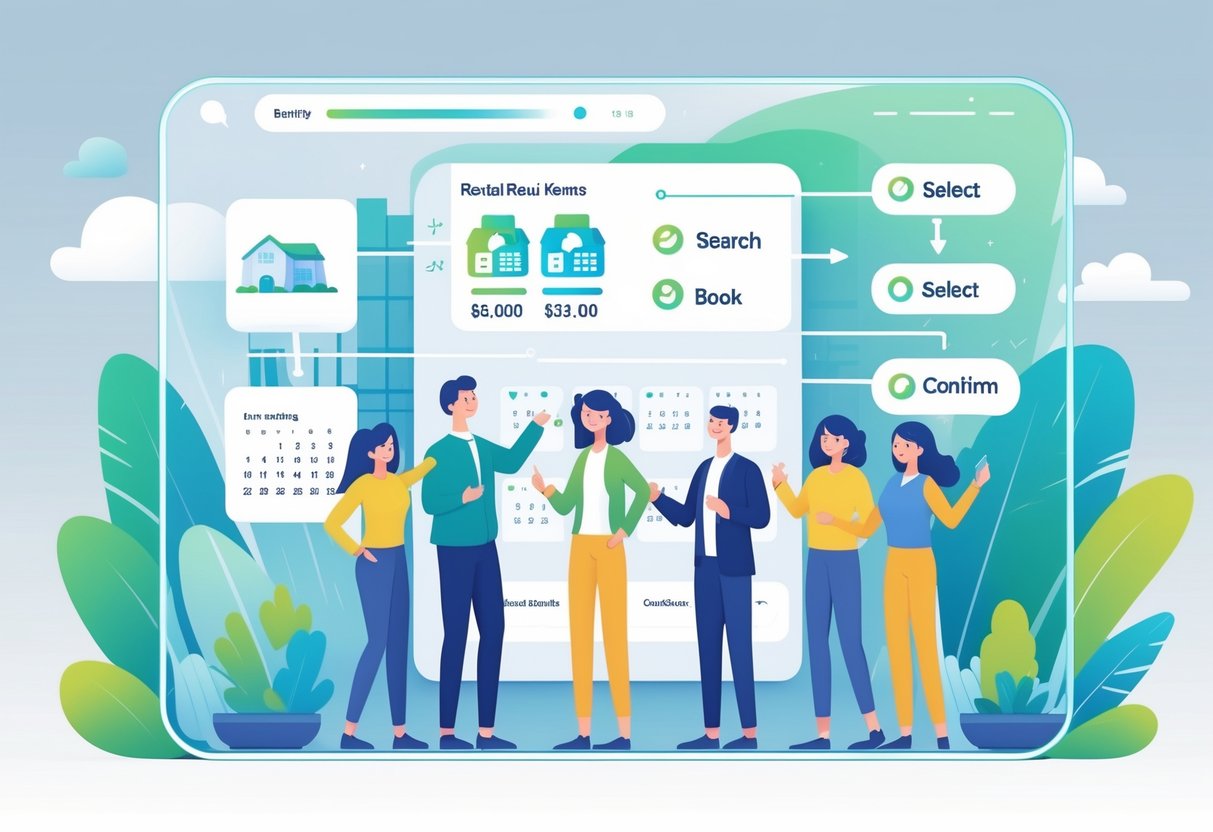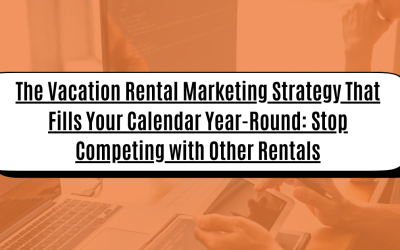Rental property owners lose thousands every year in commission fees to platforms like Airbnb and Vrbo. These sites take a 10% to 20% cut, eating into profits and limiting your control over pricing and guest relationships.
A direct booking system lets rental owners accept reservations right on their own website. No more commission fees, and you get to shape the entire booking experience.

Setting up a direct booking system is more than just launching a website. You’ll need secure payment processing, an availability calendar, and smart marketing to compete with the big platforms.
If you manage several properties, the time and costs can feel like a lot to take on at first.
Still, the financial upside is hard to ignore. Direct booking websites help vacation rental owners keep more money instead of paying hefty platform fees.
You also get guest data, stronger relationships, and your own brand identity in a crowded market.
Key Takeaways
- Direct booking systems save rental owners 10-20% by cutting out commission fees
- Must-have features: secure payment processing, mobile-friendly design, and availability management tools
- Success means pairing website development with targeted marketing to actually get bookings
What Is a Direct Booking System for Rentals?

A direct booking system lets guests reserve rentals without going through third-party sites. Owners get full control over reservations and skip the 3% to 20% commission fees.
Definition and Core Components
A direct booking system lets property managers and hosts take reservations right on their own websites. It skips the online travel agencies like Airbnb, Vrbo, and Booking.com.
Core components:
- Booking engine – Handles reservations and payments
- Availability calendar – Displays real-time open dates
- Payment gateway – Takes care of secure credit card processing
- Property management tools – Manages guest communication and check-ins
- Website integration – Brings booking right into your own site
The system connects straight to your website. Guests can check dates, see prices, and book—all in one spot.
Most systems work well on phones and send automated confirmation emails. You’ll also get booking management tools to stay organized.
Comparison to Online Travel Agencies (OTAs)
Direct booking systems work differently than OTAs. Airbnb and Vrbo charge 15% to 20% commission per reservation.
Direct booking systems skip these fees. You keep all your rental income except for payment processing costs.
| Feature | Direct Booking System | OTAs |
|---|---|---|
| Commission fees | 0% | 15-20% |
| Guest data access | Full access | Limited access |
| Pricing control | Complete control | Platform restrictions |
| Brand visibility | Your brand only | Platform brand priority |
OTAs bring marketing reach to millions of travelers. With direct bookings, you’ll have to bring in your own traffic through SEO and ads.
But here’s something interesting: direct bookings average $1,935 compared to $906 on Airbnb. That extra income can make up for the extra marketing costs.
Key Stakeholders: Hosts, Property Managers, and Guests
Hosts and property managers get the biggest benefits from direct booking. They control guest relationships and all communication.
You can offer personal touches—maybe a welcome basket or local tips. Plus, you collect guest data for your next marketing campaign.
If you manage several properties, it’s easier to keep track of everything in one place. No more juggling multiple OTA accounts and their ever-changing rules.
Guests get a smoother booking process and avoid extra fees. Many travelers actually prefer booking directly on brand websites.
Direct contact with hosts means guests can ask about amenities or the best local spots. It usually leads to better service and more personalized attention.
Travelers might also score exclusive deals, discounts, or perks you won’t find on OTAs. Sometimes it’s a room upgrade, sometimes a special package—little things that make a stay memorable.
Benefits of Using a Direct Booking System

Direct booking systems cut out third-party fees and give owners full control over their business. You can boost profits, build real guest relationships, and create a brand that stands out.
Reduced Commission Fees and Improved Profit Margins
Booking platforms usually take 15% to 20% commission from every reservation. That’s a big chunk out of your profits.
With direct booking, you keep 100% of your revenue. If your rental earns $50,000 a year on third-party sites, you could save $7,500 to $10,000 by going direct.
Cost Comparison Example:
- Third-party booking: $200/night – 18% commission = $164 net
- Direct booking: $200/night – 0% commission = $200 net
- Savings per booking: $36
Owners can offer better rates to guests and still make more profit. Guests pay less, owners earn more—a win for everyone.
Extra profit can go into property upgrades, more marketing, or even expanding your business. Some owners find direct bookings bring steadier income than relying on platforms.
Stronger Brand Recognition and Online Presence
Direct booking systems help you build a brand instead of just being another listing. You can show off what makes your property unique and tell your story.
A dedicated website means you control the look, the message, and the guest experience. Show off your amenities, highlight local attractions, and offer services that set you apart.
Branding perks:
- Custom website design that matches your vibe
- Professional photos showing off your space
- Owner-approved guest reviews and testimonials
- Social media links for wider reach
With a direct booking website, you can optimize for search engines. Target keywords like “beachfront rental Miami” or “mountain cabin Colorado” to bring in guests looking for your spot.
You’re not just booking stays—you’re sharing local tips, seasonal events, or anything else that keeps your audience engaged.
Improved Guest Experience and Repeat Bookings
Direct booking lets you communicate with guests from the first inquiry to after their stay. You can answer questions, give local recommendations, and solve problems fast.
Building relationships is easier when you’re in direct contact. That personal touch leads to higher satisfaction and more word-of-mouth referrals.
Repeat guests are gold. They cost less to acquire and tend to spend more. Direct booking systems make it simple to:
- Track guest preferences and booking history
- Offer loyalty discounts for return visits
- Send targeted emails about special deals
- Personalize experiences based on previous stays
Guest Retention Benefits:
- 20-30% higher lifetime value from repeat guests
- Lower marketing costs for returning customers
- More predictable bookings for planning
Collecting guest data lets you see what works and what needs tweaking. You can adjust pricing, amenities, or marketing based on real feedback and trends.
Increased Business Control and Independence
Direct booking systems put you in charge of everything—pricing, guest policies, and more. You don’t have to worry about sudden platform changes or disappearing from search results.
Where you get more control:
- Flexible pricing and dynamic rates
- Custom cancellation policies
- Your own check-in and house rules
- Direct control over payments and refunds
You get more marketing flexibility, too. Run promotions, offer seasonal packages, or create last-minute deals—no waiting for platform approval.
If one booking channel has issues, you’re not stuck. You can keep taking reservations directly, no matter what.
With full access to business data, you can spot trends and plan for growth. No more guessing what’s happening behind a platform’s curtain.
You can also connect your direct booking system with other tools—property management, accounting, or CRM software—to keep things running smoothly.
Essential Features of Direct Booking Systems
A solid direct booking system needs four main features to attract guests and keep things running smoothly. These cover everything from showing real-time availability to secure payments and managing bookings across different channels.
Integrated Booking Engine and Real-Time Availability
The booking engine is the core of any direct booking system. It processes reservations instantly and keeps your calendars up-to-date.
Real-time availability stops double bookings by syncing calendars automatically. When someone books on your site, those dates get blocked everywhere else.
Key booking engine features:
- Instant confirmation after booking
- Dynamic pricing based on demand
- Support for multiple properties
- Mobile-friendly design for easy phone bookings
You’ll want integration with payment processors like Stripe or PayPal. Guests can book and pay without leaving your site, which means fewer abandoned bookings.
Professional Website Design and SEO Optimization
A professional direct booking website builds trust with guests. Clean design and simple navigation help visitors find what they need and book with confidence.
SEO optimization is key for organic traffic. Use location-based keywords, SEO-friendly URLs, and good meta descriptions to show up in search results.
Essential design features:
- High-quality photos that show off your property
- Detailed descriptions with all the amenities
- Guest reviews and testimonials for social proof
- Easy-to-find contact info
Most guests book on their phones now. If your site isn’t mobile-friendly, Google will push you down the rankings—and you’ll lose bookings.
Channel Manager and Availability Calendar
A channel manager syncs your rental across platforms like Airbnb, Vrbo, and Booking.com. It updates rates, availability, and property info everywhere from a single dashboard.
The availability calendar gives you a quick overview of bookings and open dates. You can spot gaps and adjust prices to fill them.
Channel manager perks:
- Prevents double bookings
- Saves time—no more manual updates
- Maximizes exposure across channels
- Centralizes guest messages
Some systems show you which channels bring in the most bookings. That helps you decide where to focus your marketing.
Guest Screening and Secure Payments
Guest screening keeps your property safe and ensures quality bookings. At a minimum, verify guest identity and check for bad reviews.
Advanced screening might include:
- Background checks for longer stays
- Income verification for high-end rentals
- References from past hosts
- Collecting damage deposits before arrival
Secure payment processing builds trust with guests and protects their info. SSL encryption and PCI compliance are a must.
Offer several payment options—credit cards, bank transfers, digital wallets. Automated deposit and final payment collection saves you time and ensures you get paid.
Building a Direct Booking Website for Rentals
Building a direct booking website means picking the right platform, connecting it with property management tools, and making sure guests can book easily on any device.
There are three main decisions here, and they’ll shape how effective your website and guest booking experience turn out.
Choosing the Right Website Builder or Platform
Property owners have three main options when building a direct booking website for rentals.
Each approach offers different levels of customization and technical requirements.
Vacation Rental Website Builders make things easy. Lodgify offers the most advanced website builder with multiple templates and customization options.
Other platforms like OwnerRez and Uplisting provide simpler templates but include essential booking features.
General Website Builders like Wix and WordPress let property owners get creative with design. You can create custom layouts and add booking widgets from vacation rental software.
This approach takes a bit more technical know-how, but you get better control over your branding.
Hybrid Solutions blend the best of both worlds. A lot of owners use Lodgify with Squarespace to get advanced design features plus reliable booking tools.
It’s more expensive, sure, but the results look polished and professional.
Simple vacation rental builders work great for basic needs.
Custom solutions fit properties that need a unique look and feel.
Integrating with a Property Management System
A property management system (PMS) handles bookings, payments, and calendar syncing across platforms. Integration stops double bookings and automates guest messaging.
Channel Management keeps your availability updated everywhere—Airbnb, Vrbo, and your direct site. Systems like Guesty and Hostaway sync bookings in real time to avoid conflicts.
This automation saves you hours you’d otherwise spend updating calendars.
Payment Processing needs to handle credit cards, deposits, and refunds securely. Most PMS options come with built-in gateways that meet security standards.
Make sure the system supports different payment schedules and currencies.
Guest Communication automation sends confirmation emails, check-in instructions, and follow-ups. When you integrate, the PMS can grab guest info from direct bookings and third-party sites.
This way, guests get the same experience no matter how they book.
Reporting Features track how your direct bookings stack up against other channels. You want to see conversion rates, average booking values, and guest lifetime value from your own website.
Optimizing for Mobile and User Experience
Mobile devices now drive over 60% of vacation rental searches.
Your direct booking website has to work flawlessly on smartphones and tablets to catch these bookings.
Responsive Design adjusts layouts for different screens. Booking forms need big buttons and simple fields that work with touch.
Property photos should load fast, without eating up mobile data.
Simplified Booking Process means fewer steps from property selection to payment. Guests should finish booking in three steps or less.
Long forms and complicated navigation? Those just make people leave, especially on mobile.
Page Speed really matters for both conversions and search rankings. Compress images, and make sure your booking system loads quickly.
If your site’s slow, potential guests will just bounce to a competitor.
Search Functionality helps guests find available dates and the right property fast. Filters for amenities, guest capacity, and pricing let visitors narrow things down.
Clear calendars help avoid frustration during booking.
Trust Signals like security badges, guest reviews, and clear cancellation policies matter a lot. Mobile users need to feel confident right away—they’re unlikely to go digging for more info.
Direct Booking Marketing and Growth Strategies
Building awareness through search engines and social proof lays the groundwork for direct booking success.
Retaining past guests with targeted campaigns and loyalty perks brings the best marketing ROI.
SEO and Organic Traffic for Rentals
Search engine optimization helps rental owners compete with big platforms for travelers who already want to book. If you rank well for local search terms, you’ll catch guests actively looking to stay in your area.
Local SEO works best for vacation rentals. Focus on keywords like “vacation rentals in [city name]” and “[destination] short-term rentals.”
Essential SEO tactics include:
- Setting up Google Search Console to monitor site performance
- Creating landing pages for each property with local focus
- Publishing blog posts about local attractions and events
- Building backlinks from local tourism sites
- Optimizing site speed and mobile experience
Content marketing brings organic traffic if you focus on traveler intent. Blog posts about local events, seasonal activities, and return trip guides can turn visitors into direct bookings.
Go after long-tail keywords with less competition. Phrases like “pet-friendly cabins near [landmark]” attract people ready to book.
Leveraging Reviews, Testimonials, and Social Proof
Guest reviews build trust for direct booking sites. Positive testimonials from past guests nudge new visitors to book directly instead of through a third party.
Show reviews right on your homepage and on individual property pages. Fresh testimonials work better than old ones.
Effective review strategies include:
- Asking for reviews right after checkout
- Featuring reviews that mention specific amenities
- Including guest photos with testimonials
- Responding to all reviews professionally
- Using video testimonials from happy guests
Social proof isn’t just written reviews. Guest photos, social media mentions, and booking notifications create urgency and show popularity.
Show real-time booking activity. Messages like “3 bookings in the last 24 hours” spark action from visitors.
Third-party review sites still matter for discovery. Encourage guests to mention your company name in reviews for better brand recognition.
Incentivizing Repeat Guests with Loyalty Programs
Repeat bookings are more profitable than finding new guests. Loyal customers trust you and need less convincing to book again.
Simple loyalty programs work best. Something like a 10% discount for return guests gives clear value—no need for complicated points.
Successful loyalty incentives include:
- Early check-in and late check-out
- Free amenity upgrades
- Access to new properties before others
- Birthday or anniversary stay discounts
- Referral bonuses for bringing friends
Timing matters. Contacting past guests 10 months after their stay hits when they’re likely thinking about their next trip.
Personalized offers based on guest history work better than generic ones. Summer guests get beach deals; winter guests get ski packages.
Track guest lifetime value to decide how much to spend on loyalty perks. High-value repeat guests deserve more attention.
Effective Email Marketing and Retargeting
Email marketing keeps you in touch with past guests and warms up new leads. Automated email sequences convert leads without much manual work.
Build your list from website signups, WiFi portals, and post-stay follow-ups.
High-performing email campaigns include:
| Campaign Type | Timing | Purpose |
|---|---|---|
| Welcome Series | Immediately | Introduce your brand and offer a discount |
| Post-Stay | 3-7 days after checkout | Ask for reviews and share a return guest code |
| Seasonal Promotions | Monthly | Highlight local events and open dates |
| Anniversary Messages | 10-12 months later | Encourage repeat visits with nostalgia |
Segment your list by property type, travel dates, and booking history for better open rates. Beach house guests get ocean content, mountain guests get hiking or ski updates.
SMS marketing works great for time-sensitive deals. Last-minute availability and flash sales get noticed via text.
Retargeting ads follow up with website visitors who didn’t book. Facebook and Google ads featuring the properties they viewed keep your brand top of mind.
Challenges and Risks of Direct Booking Systems
Direct booking systems give property managers new operational headaches that need solid planning. The biggest challenges? Preventing calendar conflicts, ensuring guest security, and reducing reliance on big booking platforms.
Managing Double Bookings and Calendar Sync
Double bookings are a nightmare when you use multiple channels plus your own direct site. This happens when the same property gets booked for overlapping dates on different platforms.
Most calendar syncs update every 15–30 minutes. That lag means two guests could book the same dates at once.
Property managers deal with several sync headaches:
- Channel delays: Some sites take longer to update calendars
- System failures: Tech glitches can break syncing
- Manual errors: Forgetting to block out dates for repairs or personal use
- Peak times: High demand means more risk of conflicts
Double bookings cost more than just lost revenue. You’ll have to cancel guests, find them somewhere else to stay, and handle the fallout from bad reviews.
Modern PMS options offer real-time calendar integration to cut down on these risks.
Still, always have a backup plan for when tech fails.
Guest Screening and Security
Direct bookings mean you lose the safety net of big platforms, so security becomes your problem. When you rely on direct bookings, you take on more risk with guest management.
Big platforms offer basic guest verification through reviews. With direct bookings, you need your own screening process.
Key security challenges:
- Identity verification: Confirming who guests are, without platform help
- Payment fraud: Handling chargebacks and scams on your own
- Property damage: Managing issues without built-in insurance
- Guest behavior: Screening for problem guests without a review trail
Advanced direct booking platforms now require guest vetting before managers see booking requests. Some use ID scanning and fraud scoring.
But go too far with security checks, and you’ll scare off legit guests.
Transitioning from OTAs to Direct Bookings
Leaving big online travel agencies is risky. Most managers see a drop in booking volume at first.
Common fears include guest vetting, chargeback management, and tax headaches when switching to direct bookings.
Transition challenges:
- Marketing reach: Getting traffic without OTA exposure
- Guest trust: Building credibility from scratch
- Technical setup: Handling payments and bookings yourself
- Customer service: Managing support without platform help
Most managers lose some revenue during the switch.
Building momentum for direct bookings takes time, consistent marketing, and sharp pricing.
Gradual transitions usually work better than cutting OTAs cold turkey. Test your direct system while keeping some listings on the platforms.
Top Tools and Platforms for Direct Booking Systems
Property managers can pick from specialized booking platforms, PMS integrations, or building custom sites. Each path gives you different control, features, and complexity.
Specialized Direct Booking Platforms
Zeevou provides commission-free direct bookings with automated messaging and analytics. It can turn your Airbnb listings into branded sites automatically.
Lodgify offers a drag-and-drop website editor with payments and multi-language support. Hosts who aren’t techy like how simple it is.
Guesty uses AI to boost conversions and get your listings seen. If you manage multiple properties, you’ll like the automated pricing and guest messaging.
Boostly creates professionally designed WordPress sites that focus on conversions. They’ll do the setup if you want a high-performing site without the hassle.
Key Platform Features:
- Real-time availability sync
- Multi-currency payments
- SEO tools
- Guest ID verification
Popular Property Management Integrations
Hostaway provides WordPress-based direct booking sites with custom branding. Pros use this for multi-channel distribution.
Most platforms connect with major PMS options like Guesty, Hostfully, and BookingSync. This keeps you from double-booking across OTAs and direct channels.
Uplisting syncs with Airbnb and other big sites automatically. Smaller hosts like the simple setup and fair pricing.
Integration features you’ll want:
- Channel manager connectivity
- Automated rate and availability updates
- Guest messaging sync
- Revenue reporting consolidation
Custom vs. Turnkey Website Solutions
Turnkey solutions like Lodgify and Boostly hand you ready-made templates with booking engines already built in. These vacation rental website options can launch in just days or weeks.
Custom website solutions give you total design control and the chance to add unique features. Developers can shape branded experiences that match your business needs—down to the smallest detail.
Turnkey Benefits:
- Faster deployment time
- Lower upfront costs
- Built-in booking functionality
- Ongoing technical support
Custom Benefits:
- Complete design flexibility
- Unique feature development
- Full data ownership
- No monthly platform fees
Website builder platforms designed for rentals usually include hosting, SSL certificates, and mobile optimization. Property managers have to weigh setup speed against customization needs—there’s always a trade-off.
Frequently Asked Questions
Property owners ask about features that make direct booking systems effective and profitable. Knowing the differences between free and paid options helps rental managers make better decisions about booking tech.
What are the top features to look for in a direct booking system for rental properties?
Property owners should put secure payment processing and mobile-friendly design at the top of their lists. These features let guests book safely from any device.
Real-time availability management stops double bookings across platforms. The system should sync calendars automatically to avoid scheduling headaches.
Easy-to-use interfaces with clear navigation help guests book fast. Simple flows mean fewer people drop off at checkout.
Search engine optimization tools built into the platform can boost property visibility. They help your listing show up higher in search results.
Customer support options like live chat or phone assistance build trust. Fast answers to questions can turn a maybe into a yes.
How does a direct booking system benefit vacation rental owners compared to third-party platforms?
Direct booking systems cut out commission fees—usually 10% to 20%—that Airbnb and Vrbo charge. That’s money right back in your pocket.
Property owners keep full control over pricing and availability. You can tweak rates instantly, no need to wait for anyone’s approval.
Direct communication with guests helps owners build stronger relationships and offer a more personal touch. That alone can mean more repeat bookings and better reviews.
Direct bookings let owners collect guest data. You can use this info for targeted marketing and future promos.
Brand identity gets a boost when guests book directly through your site. It’s a small thing, but it helps build long-term relationships.
Which free vacation rental management software offers the best value for property owners?
Hostaway gives existing users a free website builder with their property management system. That integration makes booking management seamless—no extra costs.
Free platforms usually include basic booking calendars and simple payment processing. They often limit the number of properties or bookings you can have.
Most free systems require you to display the software company’s branding. That can make your site look less professional.
Feature restrictions in free versions mean limited customization and basic reporting. If you want advanced marketing, you’ll need to pay up.
What are the key differences between free and paid rental booking systems?
Free systems generally limit how many properties you can manage at once. Paid versions usually let you list and book as many as you want.
Customer support quality can vary a lot. Paid systems tend to offer priority help—phone, live chat, the works.
Paid subscriptions unlock more customization options. You can remove third-party branding and design your site your way.
Integration with other business tools gets way easier in paid versions. That can make marketing, accounting, and communication a breeze.
Advanced reporting and analytics mostly show up in paid systems. These tools help you track how you’re doing and tweak your booking strategy.
How can property managers increase their direct bookings for short-term rental accommodations?
Search engine optimization with location-specific keywords helps your place show up in the right searches. Words like “beachfront vacation rental” bring in targeted visitors.
Social media marketing on Instagram and Facebook lets you show off your property with photos and stories. Regular posts and guest testimonials keep your audience engaged.
Email marketing campaigns to previous guests can spark repeat bookings. A well-timed special offer or seasonal promotion might bring someone back.
Guest referral programs with discount incentives encourage happy customers to spread the word. Word-of-mouth can be surprisingly powerful.
Professional photography and detailed descriptions help guests picture their stay. Great images really do make a difference when it comes to bookings.
What are the critical factors in choosing the best short-term rental management software?
You’ve got to look at how well the software integrates with your current booking platforms. If it can’t prevent calendar conflicts, you’ll end up with double bookings and headaches.
Channel management is a big deal, too. Good software will sync your availability across all the sites you use, so you’re not stuck updating things manually.
Setup time requirements vary significantly between different platforms. Some systems might need 10-15 hours just to get everything configured and to train you on the basics.
Pricing is all over the map. Some companies take a percentage of each booking, while others charge a flat monthly fee.
You’ll want to crunch the numbers based on how many bookings you get. Sometimes a flat fee is cheaper, sometimes not—it really depends on your volume.
When something breaks, how fast can you get help? Technical support can make or break your experience, especially during busy seasons.
If your business is growing, scalability matters. The software should let you add more properties without causing chaos.
Mobile access is non-negotiable these days. Both you and your guests need to use the system easily on phones, tablets, or laptops.




0 Comments